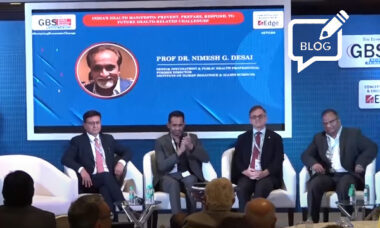 Last week I wrote here about the sudden (and far from entirely unjustified) surge in concern about disposable vapes, and the way that it is founded not only on rational worries but also on deeper, emotional antipathies toward tobacco, toward nicotine, toward the concept of addiction, maybe even toward the use of what are sometimes called “substances”.
Last week I wrote here about the sudden (and far from entirely unjustified) surge in concern about disposable vapes, and the way that it is founded not only on rational worries but also on deeper, emotional antipathies toward tobacco, toward nicotine, toward the concept of addiction, maybe even toward the use of what are sometimes called “substances”.
And this week I was reminded of the very same issues again by an interview we published with Sudhanshu Patwardhan, the medical director of the Centre for Health Research and Education in the UK.
Patwardhan is speaking next month at the Global Forum on Nicotine in Warsaw about the need to separate perceptions of nicotine from perceptions of tobacco – an important topic. But it wasn’t just that which grabbed my attention; it was also his comments on his native India, where he observed that the “public health community has a high level of misperception about nicotine. Indian clinicians might advise their patients to quit tobacco, but without offering any behavioural support or adequate nicotine replacement. That is a recipe for quitting failure and relapse.”
India is not unique in this, of course (in fact we seem to see it to a greater or lesser extent in virtually every country’s conversations on tobacco harm reduction). But its politicians and policymakers have historically been exceptionally vehement in their opposition to reduced-risk products, and it may now be unique in the literalness with which at least one arm of government has taken regulatory strictures against harm reduction.
An incident earlier this year, while perhaps not of any far-reaching significance in itself, illustrated just how extreme – verging on the absurd – a dogmatic refusal to engage with the complexities of the debate can become.
A freedom of speech issue
The Economic Times, a highly reputable and long-established Indian business newspaper, ran its annual Global Business Summit. The event covered an eclectic range of topics from batteries to video games, cricket to hydrogen to telecoms; India’s prime minister, Narendra Modi, gave a keynote speech and several of his government’s ministers were also on the speaker line-up.
But among the smaller components of this event was a panel discussion on harm reduction. And, though by all appearances the Global Business Summit was about as far removed from a vape fair as you can imagine – it’s difficult to believe the assembled CEOs and pundits rushed off afterwards to buy their very first cherry-caramel disposables – the Ministry of Information and Broadcasting in New Delhi nevertheless came down on it: “the forum was apparently used to promote electronic cigarettes”.
The event was, in the ministry’s reading, a contravention of section 4.ii of the country’s Prohibition of Electronic Cigarettes Act 2019 (“no person shall…advertise electronic cigarettes or take part in any advertisement that directly or indirectly promotes the use of electronic cigarettes”).
This has been seen as a freedom of speech issue, and indeed the act’s definition of “advertisement” (“any…publicity, representation or pronouncement”, without reference to its intention or context) does seem rather more wide-ranging than the term’s usual meaning would suggest.
But whatever the merits or otherwise of that particular definition, the information ministry’s action is a vivid example of the obstacles that reduced-risk advocates in some countries face in even getting a fair hearing for their argument.
It may well be that this was nothing more than a case of knee-jerk bureaucracy, without any particular sinister implications. Yet it says a great deal about the depth and strength of distrust in harm reduction that, during whatever internal process led to the issuing of that ministry notice, nobody acknowledged the difference between discussing the concept at a sober, high-level international conference and slapping up a poster advertising cheap flavoured vapes.
– Barnaby Page TobaccoIntelligence staff







